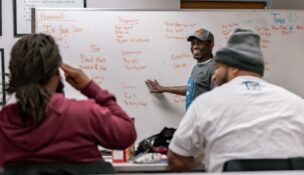Student entrepreneurs learn life skills, business acumen
Staff //March 30, 2018//

Inside a commercial space at 2021 Reynolds Ave. in the Chicora-Cherokee neighborhood of North Charleston, students transform into entrepreneurs every day after school.
They run two businesses: Hodari Screen Printing, which prints logos and designs onto T-shirts and other products, and Isoke Fine Jewelry, a handmade jewelry business.
Students handle the operations from start to finish: marketing their companies through Facebook, websites, word of mouth and events; creating the products by hand; interacting with customers; and handling sales and fulfilling orders.
Metanoia, a nearby nonprofit that focuses on building up existing resources within the community, launched the youth entrepreneurship program in 2009, using a national curriculum called Network for Teaching Entrepreneurship.
The Rev. Bill Stanfield, Metanoia’s CEO, said previously he and other community members noticed talented neighborhood youths in need of a place to spend their time and energy.
The goal remains the same today: to teach relevant workforce and life skills.
“While they’re working on their business skills, they’re also working on their social skills, those communication skills — being able to look the customer in the eye, being able to articulate what it is that they want,” said Craig Logan, Metanoia’s middle and high school coordinator, who oversees the student entrepreneurship program.
The students can gain real-world business experience, earn an income and build something within their own neighborhood, Logan said.
They also receive mentorship, financial literacy assistance and workforce training from program leaders and people in the business community who come talk to the students.
“I always commend them for choosing to come here five days a week after school,” Logan said of the students. “They are strengthening their social skills, their business skills and their leadership skills.”
Screen printing, handmade jewelry
Chrishawn Varns, an eleventh-grader at West Ashley High School, works as the business manager of Hodari Screen Printing. Varns, who lives in North Charleston, arrives at the center every day after school and gets to work, managing the operation and orders on the computer.
“The job just fit me,” said Varns, who assumed the role a few years ago.

His office space has a large window with a view into the screen printing operation. While his friends and fellow student entrepreneurs imprint logos onto T-shirts next door, he looks over customer invoices.
Varns said his role is to keep everything organized. He monitors production rates and ensures customers get their orders on schedule.
He said customer interactions have taught him how to handle the stresses of big orders or an unhappy customer, as well as the pleasures of meeting new people or receiving positive feedback from satisfied customers.
“I’m going to college to major in business, so this is a good opportunity for me to get the experience of being a manager,” Varns said. “It also gives you something to do and gives you more experience for life. It puts you in a position where you can be ready for the real world.”
Tonisha Forrest, a ninth-grader at Academic Magnet High School, said she was unsure at first whether she could balance her schoolwork and the job. With her grandmother’s encouragement, she decided to pursue working at Hodari Screen Printing.
“I was worried if I could handle the workload with school, but I’m handling it really well and really enjoying myself,” she said. “It’s really like a close-knit family.”
Forrest is one of the students working to fill orders for the screen printing operation. Orders range from around 10 T-shirts to more than 700. The company produces shirts, hats, mugs and other items for schools, nonprofits, churches, summer camps, events and businesses.
Forrest works at one of six stations on a screen press in the center of the room; precision and attention to detail are critical.
She places the sheet with a company logo design onto the machine and coats the entire image with white ink. Too little paint means the logo will not imprint correctly on a T-shirt. Any accidental paint splatters distract from the design.
“Sometimes customers give you a design, sometimes we come up with it on our own,” Forrest said.
She then puts a blank T-shirt onto the base of the machine, carefully smoothing it out and centering it before pressing the inked design onto the fabric. With the logo now on the shirt, she places it onto a conveyor belt that goes into a drying machine.
Within a few minutes, the finished T-shirt is folded and placed onto a shelf, awaiting pickup. A large whiteboard on the wall shows all the ongoing orders and their status.
“Over the last year, we have doubled our business, as we have become a lot better in the process of screen printing and marketing as we reach out more to clients. The students take full credit for that,” Logan said. “We have about 2,000 shirts in the pipeline right now.”
Isoke Fine Jewelry, the student-run jewelry-making business, operates out of a room next door to the screen printing operation. A group of students comes up with original jewelry designs and then produces and sells necklaces, earrings and bracelets.
‘We are growing so much’
The entrepreneurship program’s two businesses are currently run by 17 students, the largest group to date. Most of the students have been in Metanoia programs since the first grade, but some are recruited for the entrepreneurship program. All must undergo an application and interview process.
Metanoia plans to renovate the adjacent building to make more room for student entrepreneurs to run their businesses.
“We are growing so much, we have to expand into the building next door,” Logan said. “We are outgrowing our space.”
The money generated from the businesses is used for wages and operating expenses, as well as to add to students’ savings accounts, which Metanoia sets up for the students.
Ideally, students will have $1,000 upon graduation, and Metanoia, along with corporate partners, will at least match that amount. The students can use the money for education expenses or to launch their own business.
“Seeing this process of the students coming through the program and seeing them grow into these young adults, it’s amazing,” Logan said. “We hope that this program gives them the skills that they need to maintain in the real world, so whenever high school is over and they’re taking whatever that second step is for them, we want to make sure we imparted enough into them that they will be successful.”

















